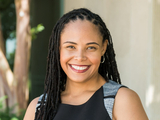UMBC announces largest-ever group of Postdoctoral Fellows
Faculty Diversity improving
UMBC’s newest Postdoctoral Fellows for Faculty Diversity will soon begin a two-year experience focused on growing their research and refining their teaching skills through professional development opportunities and working closely with faculty mentors, in preparation for possible tenure-track faculty positions at UMBC.
The fourth cohort of fellows—the largest in program history—includes Lisa Cassell, philosophy; René Esparza, American studies; Christine Hawn, geography and environmental systems; Erika Fountain, psychology; Adanna Jones, dance; Camee Maddox-Wingfield, sociology and anthropology; and Noor Zaidi, history.
“UMBC is fortunate to have been able to attract a group of such outstanding young scholars whom we now welcome as members of our community,” says Philip Rous, provost and senior vice president for academic affairs. “These fellows represent the best of UMBC and our commitment to attracting scholars from diverse backgrounds and perspectives to further advance our shared values of inclusive excellence through world-class scholarship and a distinctive educational experience for all of our students.”
As a Maryland native who earned her Ph.D. at the University of Florida, Maddox-Wingfield knew that she wanted to return to the University System of Maryland for the next step in her career. “This postdoctoral fellowship opportunity will mark a major milestone in my career trajectory,” she shares. “It is my goal to complete a book manuscript based on my dissertation field research, and gain pedagogical skills that will make me a more effective instructor and mentor to students.”
Fountain explained that UMBC’s commitment to diversity is a reason why she chose to join the program for 2017 – 19. “I believe being part of a community that embraces different perspectives is essential to producing top quality research. I look forward to working with the outstanding mentors at UMBC and furthering my research on issues related to juvenile justice,” she said.
Esparza shared in Fountain’s excitement to develop his research in a supportive community that values diversity. “I am enthusiastic about sharing my passion for teaching and commitment to community engaged scholarship through the Postdoctoral Fellowship for Faculty Diversity Program, in hopes of fulfilling UMBC’s mission to prepare students for a multicultural, global society,” he reflected.
Christine Hawn. Photo by Marilu Lopez Fretts.
Hawn agrees, noting, “I’m looking forward to having the time, mentorship, and resources necessary to build my own research program. Because this fellowship is centered around diversity, I’m taking the opportunity to develop sound ecological research that is informed by my identities.”
In addition to continuing to publish and present her research, Cassel is particularly interested in the teaching opportunities the fellowship provides. She says, “I’m looking forward to developing new courses for the philosophy department—courses that I’ve always wanted to teach, and that I’ll finally have the opportunity to teach, at UMBC.”
Jones is looking forward to working with her two mentors Carol Hess, dance, and Kimberly Moffitt, American studies. “Ultimately, this fellowship offers me the time to complete my book proposal, as well as get critical feedback on my research-based choreography,” she says.
Adanna Jones. Photo courtesy of Adanna Jones.
This year, UMBC’s College of Natural and Mathematical Sciences also launched a program designed to fulfill the same needs as the university-wide Postdoctoral Fellows for Faculty Diversity program, but with a specific focus on career trajectories in the natural sciences.
UMBC’s new Natural Sciences Pre-professoriate Fellowship program offers fellows an appointment of up to two years, during which scaffolding is in place to prepare the pre-professoriate fellows for tenure-track assistant professor positions at UMBC. In addition to being strong scholars, the program stipulates that applicants must be committed to diversity in the academy. Fellows receive research and teaching guidance from a faculty mentor, work on a collaborative research project, teach one class per semester, mentor students in the STEM BUILD program, and participate in the Active Learning, Inquiry Teaching Certificate program.
The first two scholars to accept appointments through the program, Fernando Vonhoff and Mercedes Burns, will join UMBC’s biological sciences department this fall. Vonhoff is currently a postdoctoral research associate in molecular, cellular and developmental biology at Yale University, and Burns is a National Science Foundation postdoctoral fellow in biology at San Diego State University.
Phil Farabaugh, professor and chair of biological sciences, is tremendously excited about the high quality of fellowship applications received. He explained that in addition to having strong research credentials, the dozens of candidates who applied have demonstrated a longstanding commitment to diversity in the sciences, including “a lot of work with undergraduates and younger kids in reaching out to underrepresented populations,” work the department hopes the selected fellows will extend at UMBC.
These initiatives are part of a broader effort by UMBC to build and steward a faculty that reflects and effectively meets the needs of the university’s highly diverse student body. Also included in this effort is the successful ADVANCE program to increase the number of women faculty members.
Read more about the Postdoctoral Fellows for Faculty Diversity program, including information about previous cohorts.
Banner image: Camee Maddox-Wingfield. Photo by Marlayna Demond ’11 for UMBC.
Posted: August 30, 2017, 2:16 PM
